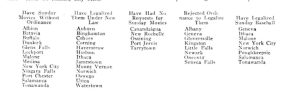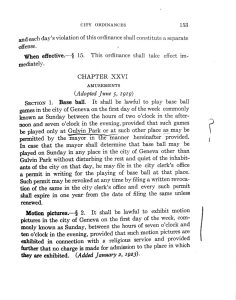No Movies on Sunday
By Becky Chapin, Archivist
Much like my article on daylight saving time, this post takes a similar path in how local laws spring from the result of state laws. On April 19, 1919, New York State passed two separate acts that granted cities a local option to legalize Sunday movies and baseball games. Prior to this, Sunday movies were under “blue laws.” Blue laws were named for the color of the books in which religious laws were bound and date back to a 1695 colonial statue which disallowed certain activities on the Sabbath.
New York State’s Sabbath laws were enacted in the 1780s and 1790s, but new activities were continually added well into the 1800s, including baseball and moving pictures. In 1907, the first attempt was made by Assemblyman Alfred E. Smith to legalize Sunday baseball. While this attempt failed, in April 1919 now-Governor Smith signed a law lifting the state ban on both Sunday baseball and Sunday movies. The law allowed both activities after 2 p.m., obviously to appease churches and avoid church service times.

The American City, list of various NY cities contacted for the article on legalizing Sunday movies and baseball.
While looking for more information on this statewide repeal, I found Geneva mentioned in The American City magazine issue for January 1920. Geneva City Clerk William A Riley is quoted, “The Council adopted an ordinance permitting the playing of baseball on Sunday and rejected Sunday moving pictures.” The piece reached out to dozens of cities in New York and listed them in various categories, including those who allowed Sunday movies without a need for an ordinance or had no requests to legalize them.
The Council quietly passed an ordinance in January 1923 which allowed movies to be shown on Sundays between the hours of 7 p.m. and 10 p.m. The movies had to be connected with a religious service and the theater could not charge any admission.
In December 1923, management of the Temple and Regent Theatres requested the Common Council allow them more latitude to show movies on Sundays. Regent Manager Clinton C. Young said the appeal was the result of continual requests from theater patrons for such a thing, and provided a petition with 800 names on it. Mayor Robert Catchpole and Mayor-elect Jasper B. Stahl both expressed support for allowing Sunday movies.
As expected, Geneva churches formed a line of opposition with many pastors taking to the pulpit to speak out against Sunday movies. Some even criticized theaters for showing questionable pictures; this was at a time when a trade association had just been formed to ensure American films had a clean moral tone.[1] Other local opponents included the Women’s Christian Temperance Union, Seneca Chapter DAR, older boys of the YMCA, the Parent Teachers Association, and the Boy Scouts.
Then, just like the daylight saving issue, the Council requested that the Chamber of Commerce hold a referendum on the movie issue. The Chamber held a vote on January 22, 1924 where registered voters expressed their wish to allow Sunday movies by a majority of 347—1883 in favor and 1536 opposed.
The Common Council voted on the topic in February 1924, legalizing Sunday movies between the hours of 2 and 10 p.m. with 9 aldermen for and 3 against the ordinance. The ordinance was for the exhibition of motion pictures only, no song, dance, or other form of vaudeville entertainment would be permitted.
Despite the ordinance passing, Sunday movies were still in discussion between the Geneva Daily Times and the Hobart Herald. William Smith College faculty held a discussion on the topic in March 1924 which the Times reported on, mostly from the opposition side. This was because the editor of the Times, William Gracey, was himself in opposition to them because of their interference with the Sabbath and had written editorials in December 1923 and January 1924 to that effect. The Herald headlined the March article “Blue Law Mania” calling the editors of the Times unsportsmanlike in their unwillingness to “print material which does not coincide with their views upon a subject.”
There were no further ordinances on the subject, and by 1948 any restriction on Sunday movies and baseball had been removed from the charter and ordinance publications.
References:
Buttenheim, Harold ed., “Local option on Sunday Motion Pictures in NYS reveals a divided public opinion,” The American City: Town and Country Edition, January 1920, p. 46-47.
Goller, Robert Lowell, EA Decided Fate of Sunday Baseball and Movies in 1922, http://www.townofaurora.com/index.php/download_file/view/4109/147/.
New York Times, June 5, 1922, “Ultimatum by Hays to Purify Movies,” https://timesmachine.nytimes.com/timesmachine/1922/06/05/99026661.pdf?pdf_redirect=true&ip=0.
[1] New York Times, June 5, 1922.

